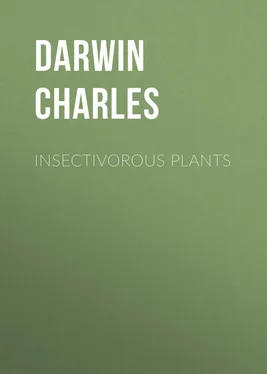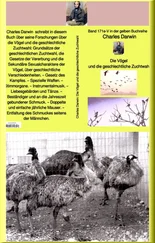Charles Darwin - Insectivorous Plants
Здесь есть возможность читать онлайн «Charles Darwin - Insectivorous Plants» — ознакомительный отрывок электронной книги совершенно бесплатно, а после прочтения отрывка купить полную версию. В некоторых случаях можно слушать аудио, скачать через торрент в формате fb2 и присутствует краткое содержание. Жанр: foreign_antique, foreign_prose, на английском языке. Описание произведения, (предисловие) а так же отзывы посетителей доступны на портале библиотеки ЛибКат.
- Название:Insectivorous Plants
- Автор:
- Жанр:
- Год:неизвестен
- ISBN:нет данных
- Рейтинг книги:5 / 5. Голосов: 1
-
Избранное:Добавить в избранное
- Отзывы:
-
Ваша оценка:
- 100
- 1
- 2
- 3
- 4
- 5
Insectivorous Plants: краткое содержание, описание и аннотация
Предлагаем к чтению аннотацию, описание, краткое содержание или предисловие (зависит от того, что написал сам автор книги «Insectivorous Plants»). Если вы не нашли необходимую информацию о книге — напишите в комментариях, мы постараемся отыскать её.
Insectivorous Plants — читать онлайн ознакомительный отрывок
Ниже представлен текст книги, разбитый по страницам. Система сохранения места последней прочитанной страницы, позволяет с удобством читать онлайн бесплатно книгу «Insectivorous Plants», без необходимости каждый раз заново искать на чём Вы остановились. Поставьте закладку, и сможете в любой момент перейти на страницу, на которой закончили чтение.
Интервал:
Закладка:
First for the non-nitrogenous fluids. As a preliminary trial, drops of distilled water were placed on between thirty and forty leaves, and no effect whatever was produced; nevertheless, in some other and rare cases, a few tentacles became for a short time inflected; but this may have been caused by the glands having been accidentally touched in getting the leaves into a proper position. That water should produce no effect might have been anticipated, as otherwise the leaves would have been excited into movement by every shower of rain.
[Gum arabic. – Solutions of four degrees of strength were made; one of six grains to the ounce of water (one part to 73); a second rather stronger, yet very thin; a third moderately thick, and a fourth so thick that it would only just drop from a pointed instrument. These were tried on fourteen leaves; the drops being left on the discs from 24 hrs. to 44 hrs.; generally about 30 hrs. Inflection was never thus caused. It is necessary to try pure gum arabic, for a friend tried a solution bought ready prepared, and this caused the tentacles to bend; but he afterwards ascertained that it contained much animal matter, probably glue.
Sugar. – Drops of a solution of white sugar of three strengths (the weakest containing one part of sugar to 73 of water) were left on fourteen leaves from 32 hrs. to 48 hrs.; but no effect was produced.
Starch. – A mixture about as thick as cream was dropped on six leaves and left on them for 30 hrs., no effect being produced. I am surprised at this fact, as I believe that the starch of commerce generally contains a trace of gluten, and this nitrogenous substance causes inflection, as we shall see in the next chapter.
Alcohol, Diluted. – One part of alcohol was added to seven of water, and the usual drops were placed on the discs of three leaves. No inflection ensued in the course of 48 hrs. To ascertain whether these leaves had been at all injured, bits of meat were placed on them, and after 24 hrs. they were closely inflected. I also put drops of sherry-wine on three other leaves; no inflection was caused, though two of them seemed somewhat injured. We shall hereafter see that cut off leaves immersed in diluted alcohol of the above strength do not become inflected.
Olive Oil. – drops were placed on the discs of eleven leaves, and no effect was produced in from 24 hrs. to 48 hrs. Four of these leaves were then tested by bits of meat on their discs, and three of them were found after 24 hrs. with all their tentacles and blades closely inflected, whilst the fourth had only a few tentacles inflected. It will, however, be shown in a future place, that cut off leaves immersed in olive oil are powerfully affected.
Infusion and Decoction of Tea. – Drops of a strong infusion and decoction, as well as of a rather weak decoction, of tea were placed on ten leaves, none of which became inflected. I afterwards tested three of them by adding bits of meat to the drops which still remained on their discs, and when I examined them after 24 hrs. they were closely inflected. The chemical principle of tea, namely theine, was subsequently tried and produced no effect. The albuminous matter which the leaves must originally have contained, no doubt, had been rendered insoluble by their having been completely dried.]
We thus see that, excluding the experiments with water, sixty-one leaves were tried with drops of the above-named non-nitrogenous fluids; and the tentacles were not in a single case inflected.
[With respect to nitrogenous fluids, the first which came to hand were tried. The experiments were made at the same time and in exactly the same manner as the foregoing. As it was immediately evident that these fluids produced a great effect, I neglected in most cases to record how soon the tentacles became inflected. But this always occurred in less than 24 hrs.; whilst the drops of non-nitrogenous fluids which produced no effect were observed in every case during a considerably longer period.
Milk. – Drops were placed on sixteen leaves, and the tentacles of all, as well as the blades of several, soon became greatly inflected. The periods were recorded in only three cases, namely, with leaves on which unusually small drops had been placed. Their tentacles were somewhat inflected in 45 m.; and after 7 hrs. 45 m. the blades of two were so much curved inwards that they formed little cups enclosing the drops. These leaves re-expanded on the third day. On another occasion the blade of a leaf was much inflected in 5 hrs. after a drop of milk had been placed on it.
Human Urine. – Drops were placed on twelve leaves, and the tentacles of all, with a single exception, became greatly inflected. Owing, I presume, to differences in the chemical nature of the urine on different occasions, the time required for the movements of the tentacles varied much, but was always effected in under 24 hrs. In two instances I recorded that all the exterior tentacles were completely inflected in 17 hrs., but not the blade of the leaf. In another case the edges of a leaf, after 25 hrs. 30 m., became so strongly inflected that it was converted into a cup. The power of urine does not lie in the urea, which, as we shall hereafter see, is inoperative.
Albumen (fresh from a hen's egg), placed on seven leaves, caused the tentacles of six of them to be well inflected. In one case the edge of the leaf itself became much curled in after 20 hrs. The one leaf which was unaffected remained so for 26 hrs., and was then treated with a drop of milk, and this caused the tentacles to bend inwards in 12 hrs.
Cold Filtered Infusion of Raw Meat. – This was tried only on a single leaf, which had most of its outer tentacles and the blade inflected in 19 hrs. During subsequent years, I repeatedly used this infusion to test leaves which had been experimented on with other substances, and it was found to act most energetically, but as no exact account of these trials was kept, they are not here introduced.
Mucus. – Thick and thin mucus from the bronchial tubes, placed on three leaves, caused inflection. A leaf with thin mucus had its marginal tentacles and blade somewhat curved inward in 5 hrs. 30 m., and greatly so in 20 hrs. The action of this fluid no doubt is due either to the saliva or to some albuminous matter 15 15 Mucus from the air-passages is said in Marshall, 'Outlines of Physiology,' vol. ii. 1867, p. 364, to contain some albumen. Mller's 'Elements of Physiology,' Eng. Trans. vol. i., p. 514.
mingled with it, and not, as we shall see in the next chapter, to mucin or the chemical principle of mucus.
Saliva. – Human saliva, when evaporated, yields from 1.14 to 1.19 per cent. of residue; and this yields 0.25 per cent. of ashes, so that the proportion of nitrogenous matter which saliva contains must be small. Nevertheless, drops placed on the discs of eight leaves acted on them all. In one case all the exterior tentacles, excepting nine, were inflected in 19 hrs. 30 m.; in another case a few became so in 2 hrs., and after 7 hrs. 30 m. all those situated near where the drop lay, as well as the blade, were acted on. Since making these trials, I have many scores of times just touched glands with the handle of my scalpel wetted with saliva, to ascertain whether a leaf was in an active condition; for this was shown in the course of a few minutes by the bending inwards of the tentacles. The edible nest of the Chinese swallow is formed of matter secreted by the salivary glands; two grains were added to one ounce of distilled water (one part to 218), which was boiled for several minutes, but did not dissolve the whole. The usual-sized drops were placed on three leaves, and these in 1 hr. 30 m. were well, and in 2 hrs. 15 m. closely, inflected.
Isinglass. – Drops of a solution about as thick as milk, and of a still thicker solution, were placed on eight leaves, and the tentacles of all became inflected. In one case the exterior tentacles were well curved in after 6 hrs. 30 m., and the blade of the leaf to a partial extent after 24 hrs. As saliva acted so efficiently, and yet contains so small a proportion of nitrogenous matter, I tried how small a quantity of isinglass would act. One part was dissolved in 218 parts of distilled water, and drops were placed on four leaves. After 5 hrs. two of these were considerably and two moderately inflected; after 22 hrs. the former were greatly and the latter much more inflected. In the course of 48 hrs. from the time when the drops were placed on the leaves, all four had almost re-expanded. They were then given little bits of meat, and these acted more powerfully than the solution. One part of isinglass was next dissolved in 437 of water; the fluid thus formed was so thin that it could not be distinguished from pure water. The usual-sized drops were placed on seven leaves, each of which thus received 1/960 of a grain (.0295 mg.). Three of them were observed for 41 hrs., but were in no way affected; the fourth and fifth had two or three of their exterior tentacles inflected after 18 hrs.; the sixth had a few more; and the seventh had in addition the edge of the leaf just perceptibly curved inwards. The tentacles of the four latter leaves began to re-expand after an additional interval of only 8 hrs. Hence the 1/960 of a grain of isinglass is sufficient to affect very slightly the more sensitive or active leaves. On one of the leaves, which had not been acted on by the weak solution, and on another, which had only two of its tentacles inflected, drops of the solution as thick as milk were placed; and next morning, after an interval of 16 hrs., both were found with all their tentacles strongly inflected.]
Читать дальшеИнтервал:
Закладка:
Похожие книги на «Insectivorous Plants»
Представляем Вашему вниманию похожие книги на «Insectivorous Plants» списком для выбора. Мы отобрали схожую по названию и смыслу литературу в надежде предоставить читателям больше вариантов отыскать новые, интересные, ещё непрочитанные произведения.
Обсуждение, отзывы о книге «Insectivorous Plants» и просто собственные мнения читателей. Оставьте ваши комментарии, напишите, что Вы думаете о произведении, его смысле или главных героях. Укажите что конкретно понравилось, а что нет, и почему Вы так считаете.












